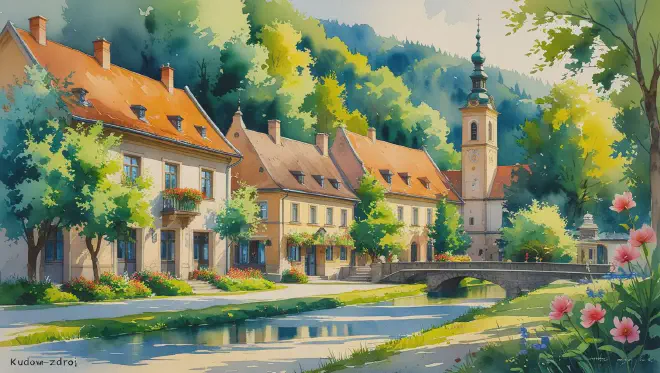Introduction: A Hidden Spa Haven
Poland officially recognizes 43 health resorts (uzdrowiska) across the nation. Among these, 26 are designated as spa towns—zdrój meaning “spring” in Polish—with most scattered along the foothills of the Sudeten Mountains that form the border with Czech Republic. Kudowa-Zdrój stands out as a small spa town renowned for its carbonated mineral springs.
Just a few kilometers from the Czech border, this town nestles in the verdant hills of the Sudeten range, wrapped in an almost timeless tranquility. Continuing a tradition of spa therapy that dates back to the 19th century, it still welcomes visitors seeking restoration and healing. The unique character of this place emerges from the blend of German-influenced architecture with Poland’s rustic cultural heritage.
I chose this town not only for the music of its name but also for its hidden charms, untouched by Japanese tourists. I yearned to escape urban clamor, to feel nature’s gifts against my skin, and to let time unfold at its own pace. With these thoughts warming my heart, I set out for Kudowa-Zdrój in early spring.

Day 1: Arrival in the Quiet Spa Town
The bus journey from Wrocław takes about two hours, and gradually the landscape outside transforms into rolling hills. As the hazy ridgeline of the Sudeten Mountains comes into view, our bus arrives at the small town center. The moment I step off, crisp air caresses my cheeks. Gone are the city scents, replaced by the rich aroma of damp forest earth and pristine water.
My accommodation, a pension just five minutes’ walk from the town center, sits surrounded by greenery. The 19th-century building has been lovingly restored, its white walls contrasting beautifully with dark green shutters. At reception, a warmly smiling woman greets me, explaining the town’s highlights in fluent English. My room on the second floor offers a corner view of the garden and the forest beyond.
After settling in, I venture out to explore the town center. The main street is cobblestoned, lined with spa-related facilities. At the building called Pijalnia (pump room), locals gather with small cups to drink the mineral water. Curiosity draws me closer, and the elderly attendant kindly explains the routine. These carbonated springs benefit the digestive system, he tells me, and should be consumed several times daily at prescribed intervals.
The spring water poured into my cup carries a faint metallic scent and delivers a tingling sensation on the tongue. Strangely, I feel warmth spreading from within. When the old man learns I’m Japanese, he shows genuine interest in Japan’s onsen culture. Despite the language barrier, we find connection through our shared appreciation of thermal springs.
For dinner, I head to the town’s sole restaurant, Karczma Sudecka. Inside the stone building, beautiful wooden beams create a warm atmosphere under gentle lighting. I order traditional Polish dishes: bigos (sauerkraut stew) and pierogi (dumpling-like pastries). The bigos offers a perfect harmony of meat and cabbage, with deep flavors from long simmering. The pierogi feature handmade dough with a delightfully chewy texture, while the potato and cheese filling provides gentle, comforting taste.
As I savor my meal with local beer, an elderly couple at the neighboring table strikes up a conversation. They’re Germans who visit annually for spa treatment at this time of year. According to them, the town’s appeal lies not merely in its springs but in the quietude where time flows slowly. It’s a place where one can forget modern life’s urgency and find time for self-reflection, they explain.
Nighttime Kudowa-Zdrój is softly lit and wrapped in silence. Walking back to my pension, I gaze up at a brilliant canopy of stars—countless points of light impossible to see in urban areas. Opening my room window, I hear night birds calling from the forest. Thus ends my first quiet evening in this gentle spa town.
Day 2: Communion with Nature and Healing
Bird songs wake me in the morning. Opening the window reveals mist veiling the garden in an ethereal scene. The pension’s breakfast features simple, healthful fare made from local ingredients—fresh vegetables, bread, and local honey creating unpretentious deliciousness.
The morning takes me to the spa facility, Uzdrowisko Kudowa-Zdrój, housed in a dignified 19th-century building that continues to serve many seeking therapeutic treatment. After purchasing a day pass at reception, I head first to the thermal pool. Entering the springs while wearing swimwear offers a different experience from Japanese onsen culture.
The pool accommodates people of various ages, all moving slowly through the water. I feel carbonated bubbles adhering to my skin, promoting circulation. Conversing with a woman doing aqua walking beside me, I learn she travels monthly from southern Poland for arthritis treatment. Her detailed explanations of the springs’ benefits help me understand that this place serves not merely as a tourist destination but as a vital center supporting people’s health.
Lunch brings me to a small café called Kawiarnia Pod Lipą—literally “Under the Linden Tree”—where tables are indeed arranged in the shade of a magnificent linden. I order żurek, a traditional Polish soup with tangy rye flavor. Containing sausage and egg, this soul-warming dish spreads heat throughout my body.
The afternoon is spent exploring the town’s surroundings. Park Zdrojowy (Spa Park), a beautiful garden created in the 19th century, showcases various trees and flowers. Walking the pathways, I observe people reading on benches and elderly couples strolling leisurely. Everyone seems to embrace the town’s characteristic gentle flow of time.
Deep in the park stands a small observation deck offering a painterly view of Kudowa-Zdrój’s panorama. Red-roofed houses nestle among forests, with the Sudeten ridgeline hazily visible in the distance. In this moment, I become completely enchanted by the town’s allure.
Evening finds me on a forest trail recommended by locals—Ścieżka Zdrowia (Health Path)—winding among various trees. Along the way, I discover a small chapel, Kaplica Stella Maris. This simple stone structure houses beautiful stained glass that glows warmly. In the silence, I experience a sense of spiritual cleansing.
Night brings me to the pension’s terrace with local wine—slightly acidic with a distinctive character reflecting the region’s soil and climate. Gazing at the stars, I reflect on the various emotions these two days have stirred. I’m rediscovering harmony with nature and the precious value of time, both easily forgotten in urban life.
Day 3: Morning of Departure and Lasting Memories
On my final morning, I rise especially early to witness the sunrise. A ten-minute walk from the pension brings me to a small hill where the eastern sky gradually brightens. Soon the sun emerges from beyond the forest, bathing all of Kudowa-Zdrój in golden light. The beauty of this moment defies words.
After breakfast, I take a final walk through the town center. Details invisible before now catch my eye: ornate decorations on old buildings, moss growing between cobblestones, locals chatting by the pump room. All these elements contribute to the town’s distinctive charm.
At a small shop while buying souvenirs, I chat with the elderly proprietress. Born and raised in Kudowa-Zdrój, she has witnessed the town’s evolution. Though tourist numbers have declined compared to earlier times, the same visitors return annually, and their interactions bring joy to her life, she shares. Purchasing local herbal tea and honey, I’m touched again by the warmth of the townspeople.
My final meal returns me to Karczma Sudecka, where I order makowiec, a traditional Polish poppy seed cake. Moderately sweet with the fragrant earthiness of poppy seeds spreading across my palate, I savor it with coffee while reviewing these three days’ experiences.
As bus departure time approaches, I return to pack at the pension. From my room window, I take one last look at the garden and forest view. Though only three days, this place has etched itself deeply into my heart.
The pension lady comes to see me off. “I’ll definitely return,” I promise, and she responds with a smile, “We’ll always be waiting.” The walk to the bus stop now passes through familiar scenery.
Boarding the bus, I look down at the town through the window. The small spa community maintains its quiet repose, preserving that timeless tranquility even as departure time arrives. As the bus pulls away and the town grows smaller, my inner impressions only become more vivid.
During the journey back to Wrocław, watching the landscape pass by, I realize this trip was not mere tourism but a time for dialogue with myself. The springs’ therapeutic benefits, nature’s beauty, interactions with locals, and above all, rediscovering the value of “unhurried time” so easily forgotten in modern society.
Conclusion: What Felt Real Though Imagined
Though this journey existed only in imagination, through the genuine charms of Kudowa-Zdrój, I truly experienced it within my heart. These spa towns, rarely visited by Japanese tourists, preserve simple and pure attractions precisely because of their remoteness.
For Japanese people sharing onsen culture, Poland’s spa therapy traditions felt both fresh and familiar. The carbonated springs’ stimulation, forest-surrounded silence, local warmth, and the luxury of slowly flowing time—all became tangible experiences through imagination.
In contemporary society, we constantly chase time and demand efficiency. Yet in places like Kudowa-Zdrój, time’s values differ completely. Here, one recovers health, harmonizes with nature, and enjoys warm human connections. Perhaps this represents true richness.
Through this imaginary journey, I encountered new values that transcended mere tourist experience to become hints for living life more fully. Kudowa-Zdrój may be just a tiny dot on the map, but it has become a special place that certainly exists within my heart.

